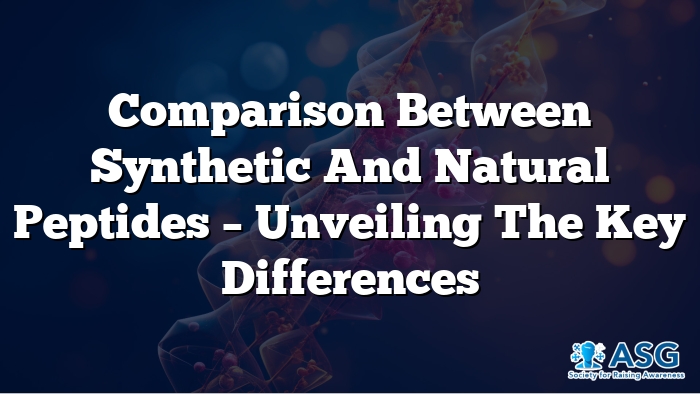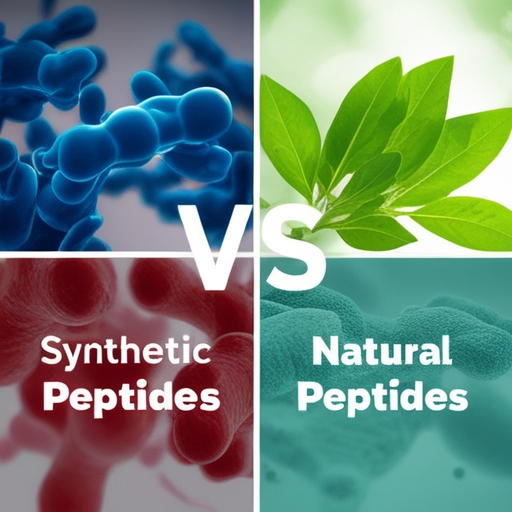Comparison Between Synthetic and Natural Peptides – Unveiling the Key Differences

Peptides are fascinating molecules that play crucial roles in numerous biological processes. These short chains of amino acids have captured the attention of researchers, medical professionals, and cosmetic experts alike. The world of peptides is diverse, with both synthetic and natural varieties offering unique benefits and applications.
Understanding Peptides: The Basics
Peptides are essentially short proteins, typically consisting of 2 to 50 amino acids. Their small size allows them to penetrate cells easily, making them valuable tools in various fields. From regulating hormones to fighting infections, peptides are integral to many bodily functions.
Synthetic Peptides: Precision Engineering
Synthetic peptides are created in laboratories through chemical synthesis. This process allows scientists to design peptides with specific sequences and functions. The ability to tailor these molecules makes them invaluable in research and drug development.
Key advantages of synthetic peptides:
• Precise control over structure and function
• Customizable for specific research needs
• High purity and consistency
Natural Peptides: Nature's Own Design
Natural peptides are found in living organisms, produced through biological processes. These peptides have evolved over millions of years to perform specific functions in plants, animals, and microorganisms.
Natural peptides are often extracted from sources such as:
1. Plants
2. Animals
3. Marine organisms
4. Microorganisms
The Production Process: From Lab to Vial
The production of synthetic peptides involves a complex process called peptide synthesis. This method requires specialized equipment and expertise. Peptide manufacturers use automated synthesizers to create these molecules efficiently.
Peptide quality control is a critical aspect of production. This includes:
• Peptide purity tests
• Peptide batch testing
• Peptide analysis
Once produced, peptides are typically stored in peptide vials to maintain their stability and purity.
Natural Peptide Extraction: Harnessing Nature's Bounty
Extracting natural peptides requires different techniques. Scientists often use methods like chromatography to isolate specific peptides from their natural sources. Bioactive peptides from food prot

eins have gained particular interest in recent years.
Structural Differences: Form Meets Function
The structure of synthetic and natural peptides can differ significantly. Synthetic peptides can be designed with precise sequences to target specific biological pathways. Natural peptides, shaped by evolution, may contain post-translational modifications that affect their function.
Medical Applications: Revolutionizing Healthcare
Peptides have found numerous applications in medicine. From diagnostic tools to therapeutic agents, these versatile molecules are changing the face of healthcare.
Some key medical applications include:
• Drug development
• Hormone replacement therapy
• Cancer treatment
• Wound healing
• Tissue regeneration
Peptide clinics are emerging as specialized centers offering peptide-based treatments for various conditions.
The Cost Factor: Balancing Price and Performance
The cost of peptides varies widely depending on several factors. Peptide pricing is influenced by:
• Type (synthetic or natural)
• Purity level
• Quantity required
• Production complexity
While synthetic peptides are often more expensive due to the intricate production process, natural peptides can also be costly to extract and purify. Peptide suppliers and peptide wholesalers often offer peptide deals and discounts for bulk purchases.
Effectiveness in Drug Development: A Promising Frontier
Both synthetic and natural peptides show great promise in drug development. Synthetic peptides can be designed to target specific receptors or enzymes, potentially leading to more effective and targeted therapies. Natural peptides, with their proven biological activity, serve as models for new drug designs.
Peptide research continues to explore ways to enhance the stability and bioavailability of these molecules for clinical applications.
Safety Considerations: Navigating Potential Risks
Peptide safety is a paramount concern in both research and clinical applications. Synthetic peptides undergo rigorous testing to ensure their safety profile. Natural peptides, while generally considered safe, can sometimes trigger allergic reactions.
Peptide customer service teams play a crucial role in providing information about potential side effects and safe usage guidelines.
Environmental Impact: Sustainability in Peptide Production
As with any scientific endeavor, the production of peptides has environmental implications. Synthetic peptide production involves chemical processes that can generate waste. Natural peptide extraction may impact ecosystems if not managed sustainably.
Many peptide manufacturers are adopting eco-friendly practices to minimize their environmental footprint.
Stability and Shelf Life: Preserving Peptide Integrity
Peptide shelf life is a critical factor in research and clinical applications. Synthetic peptides are often designed with stability in mind, while natural peptides may be more susceptible to degradation.
Proper peptide storage is essential for maintaining peptide integrity. This includes:
• Temperature control
• Protection from light
• Humidity management
Peptide reconstitution techniques are crucial for preparing peptides for use while maintaining their stability.
Regulatory Landscape: Ensuring Safety and Efficacy
The peptide industry is subject to various regulations to ensure product safety and efficacy. Peptide certificates are often required to demonstrate compliance with quality standards.
Peptide authentication is a crucial step in the regulatory process, ensuring that products meet the required specifications.
Bioavailability: Maximizing Therapeutic Potential
The bioavailability of peptides is a key factor in their effectiveness. Synthetic peptides can be designed to enhance their absorption and distribution in the body. Natural peptides may require special formulations or delivery methods to improve their bioavailability.
Peptide solutions and innovative delivery systems are continually being developed to address bioavailability challenges.
Ethical Considerations: Navigating Complex Terrain
The use of peptides, particularly those derived from animal sources, raises ethical questions. Many researchers and manufacturers are exploring alternative sources and synthetic options to address these concerns.
Transparency in sourcing and production methods is becoming increasingly important in the peptide industry.
Future Trends: The Evolving Peptide Landscape
The field of peptide research is rapidly evolving. Advances in peptide synthesis techniques and the discovery of new natural peptides are opening up exciting possibilities.
Emerging trends include:
• Personalized peptide therapies
• Combination therapies using multiple peptides
• Novel peptide delivery systems
• AI-assisted peptide design
Peptide marketplaces and online peptide stores are making these advanced molecules more accessible to researchers and clinicians.
Conclusion: The Power of Peptides
Peptides, whether synthetic or natural, represent a powerful tool in scientific research and medical treatment. As our understanding of these molecules grows, so does their potential to revolutionize healthcare and biotechnology. The future of peptide science is bright, promising new solutions to some of our most pressing health challenges.
What are the main advantages of synthetic peptides?
Synthetic peptides offer precise control over structure, customizability for specific research needs, and high purity and consistency.
How are natural peptides extracted?
Natural peptides are typically extracted using methods like chromatography from sources such as plants, animals, marine organisms, and microorganisms.
What factors affect peptide pricing?
Peptide pricing is influenced by the type (synthetic or natural), purity level, quantity required, and production complexity.
